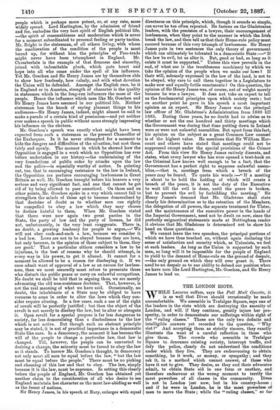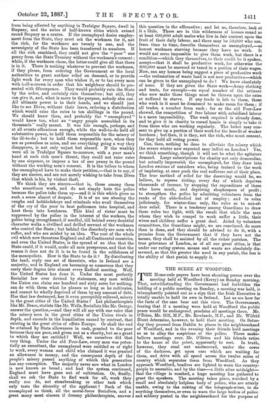THE LONDON RIOTS.
WHILE Lazarus suffers, says the Pall Mall Gazette, it is as well that Dives should occasionally be made uncomfortable. We assemble in Trafalgar Square, says one of the leaders in the riots which are destroying the amenity of London, and will, if they continue, greatly injure her pro- sperity, in order to demonstrate our sufferings within sight of the "ruling classes." Those are the only two definite and intelligible answers yet recorded to the question, " Why riot I" And accepting them as strictly sincere, they exactly illustrate the want of a careful reflection in those who
give them. The crowds who assemble in Trafalgar Square to denounce existing society, interrupt traffic, and defy the police, clearly do not understand the conditions under which they live. They are endeavouring to obtain something, be it work, or money, or sympathy ; and they ask it, in a method which cannot answer, of those who have it not to give. They desire, as they and their advocates admit, to obtain State aid in one form or another, and therefore endeavour at the wrong moment to terrify the most powerless of all classes in the community. Dives is not in London just now, but in his country-house ; and if he were in London, he is the most powerless of men to move the State ; while the "ruling classes," so far from being affected by anything in Trafalgar Square, dwell in Stepney, and the series of half-known cities which extend round Stepney as a centre. If the unemployed desire employ- ment from the State, they must ask the workmen for it, not the rich, for the workmen are twenty to one, and the sovereignty of the State has been transferred to numbers. If all the rich combined, they could not give the "poor" one penny from the State Treasury without the workmen's consent ; while, if the workmen chose, the latter could give all that there is in it. There is nothing whatever to prevent the workmen, if they please, from ordering the Government or the looal authorities to grant outdoor relief on demand, or to provide light work for every man who wishes it, or to tax every man with half-a-crown in order that his neighbour should be pre- sented with fifteenpence. They would probably ruin the State by the order, and certainly ruin themselves; but still, they can give it, and, what is more to the purpose, nobody else can. All ultimate power is in their hands, and we should just like to see Dives, without their leave, ordering a distribution which would raise the rates to ten shillings in the pound. We should know then, and probably the " unemployed " would know too, what an "angry people assembled in its thousands" really meant. It was fair enough, perhaps, and at all events efficacious enough, while the well-to-do held all substantive power, to hold them responsible for the misery of the ill-to-do ; but to hold them responsible now, when they are as powerless as mice, and see everything going a way they disapprove, is not only unjust but absurd. If the wealthy were all in Trafalgar Square to-morrow, with a poor man's hand at each rich man's throat, they could not raise rates by one sixpence, or impose a tax of one penny in the pound without the working men's consent. It is the toilers to whom the unemployed have to make their petition,—that is to say, if they are sincere, and are not merely wishing to take from Dives that which is his, by violent theft.
We think they are sincere—that is, those among them who sometimes work, and do not simply hate the police because the police take them up—and it is this which gives us such a sense almost of despair. It is of no use abusing the roughs and hobbledehoys and criminals who avail themselves of the cry of the poor to beat policemen into hospital, and hoot them into harshness. This kind of rioter must be suppressed by the police in the interest of the workers, the police being strengthened, if needful, till behind every doubtful character walks a civilised and drilled servant of the workmen who control the State ; but behind the disorderly are men who suffer, and who are misled by an idea. The root of the whole evil which now threatens England and all Continental countries, and even the United States, is the spread of an idea that the State could, if it would, make all men prosperous, and that the reason it does not do it is to be found in the selfishness of the monopolists. How is the State to do it ? By distributing the land, reply one set of theorists, who in Ireland are a majority, and in England are becoming so numerous that they carry their dogma into almost every Radical meeting. Well, the United States has done it. Under the most perfectly Socialist law ever devised by statesmen, any man within the Union can claim one hundred and sixty acres for nothing, can do with them what he pleases so long as he cultivates, and cannot be wholly deprived of them by any amount of debt. Has that law destroyed, has it even perceptibly relieved, misery in the great cities of the United States f Let philanthropists like Mr. Brace, statists like Mr. Wells, Socialists like Mr. George, answer the question,—and they will all say with one voice that the misery seen in the great cities of the Union rivals in depth, and exceeds in the humiliation caused by contrast, that existing in the great cities of effete Europe. Or shall the end be attained by State allowances in cash, granted to the poor because they are poor, and given not as a charity, but as a grant to which they are entitled ? Well, we ourselves did that very thing. Under the old Poor-Law, every man was poten- tially an annuitant, the unemployed were entitled as of right to work, every woman and child who claimed it was granted an allowance in money, and the consequent depth of the people's misery passed anything of which this generation has any conception. The majority never saw what in London is now known as bread ; and had the system continued, England must have gone out of cultivation. Or, finally, shall we ask the State to find work for all, work they really can do, not stonebreaking or other task which only tests the sincerity of the applicant V Such of the unemployed as think, all the moral-force Socialists, and a great many moat 'sincere if dreamy philanthropists, answer this question in the affirmative ; and let us, therefore, look at it a little. There are in this wilderness Of houses round us at least 600,000 adult males who live in fair content upon the fruit of their daily labour, and there may be 50,000 who can, from time to time, describe themselves as unemployed,—as honest workmen starving because they have no work. It would not seem impossible to give them work, but there is a condition—which they themselves, to their credit be it spoken, accept—that it shall be productive work, for otherwise the 600,000 must be amerced or taxed in a portion of their wages. Now, can any human being suggest a piece of productive work —the reclamation of waste land is not now productive—which can be given to the unemployed to do 9 We know absolutely of none. If they are given the State work—Army clothing and tents, for example—an equal number of the artisans who now make those things must be thrown upon the rates or suffered to starve. If any trade is left to them, those who work in it must be dismissed to make room for them ; if all trades, a number from each ; for as the old Poor-Law showed, the competition of free labour with subsidised labour is a mere impossibility. The work required is already done, and to give it in charity to casual hands is simply to take it from those who are working regularly. The latter may con- sent to give up a portion of their work for the benefit of weaker brethren ; but then, it is they, not the rich, who must consent, for they hold all voting power.
Can, then, nothing be clone to alleviate the misery which the severe winter now expected may inflict on London I Yes, we think something, though it will not be what the agitators demand. Large subscriptions for charity not only demoralise, but actually impoverish the unemployed, for they draw into London swarms of outsiders who, being trained to the work of imploring, at once push the real sufferers out of their place. The true method of relief for the deserving would be, we believe, to repress rioting, every day of which deprives thousands of income, by stopping the expenditure of those who have much, and depriving shopkeepers of profit'; to strengthen the police by admitting volunteers from the ranks of the able-bodied out of employ ; and to relax judiciously, for winter-time only, the rules as to out-of, door relief. There is a tendency among Guardians to draw these rules too tight, with the result that while the men whom they wish to compel to work suffer a little, their wives and children suffer a great deal. Aided by volunteer committees, the Guardians might, we are convinced, do more than is done, and they should be advised to do it, with a promise from the Government that if they have not the means, they shall be assisted by all the richer parishes. The true grievance of London, as of all our great cities, is that under our rating system moans and wants are absolutely die- severed, so that the greater the need in any parish, the less is the ability of that parish to supply it.







































 Previous page
Previous page